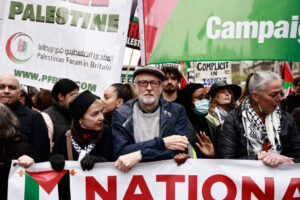Any thinking Jew today hears the alarm resounding like a shofar blast in days of old, announcing rising floodwaters or marauding Cossacks. Confronted with a worldwide, increasingly violent explosion of antisemitism, the mind turns to dark mysteries. Why have radical groups of all stripes, including all the usual suspects, coalesced in support of a suicidal death cult that raped, tortured, and murdered 1,200 Israelis and has publicly pledged to eliminate the Jewish state?
While the maligned figure of the Jew has historically been an all-purpose scapegoat, one thing seems clear enough. Western antisemitism is now primarily fuelled by identity politics, a cultural version of Marxism that analyses injustice not in terms of class, but of race, sex, ethnicity and religion. For the radical avant-garde of 2024, the revolutionary agent of global justice is not the proletariat — the united workers of the world that Marx expected to overthrow capitalism and birth the Communist utopia — but Hamas. And yet, today’s cultural Marxists nevertheless recapitulate the moral and intellectual deficiencies of the master’s philosophy. They, too, reject the central teachings of the Bible, twist and debase its narrative of salvation, and embody the fratricidal spitefulness against which it repeatedly inveighs.
Start with the perverse elevation of brutal terrorists with roots in Nazism. Most people recognise evil when they see it. Marx muddies the waters by locating evil not in individuals, but in society. While he disdains capitalists and Jews (two groups he regards as virtually identical), he rejects the pre-modern consensus of Hebrews and Christians that man is by nature a depraved animal. In this, he follows Jean-Jacques Rousseau. Comparing miserable 18th-century Europeans with the “noble savage” of his imagination, a happy and compassionate being whose existence he inferred from reading anthropological accounts of native Americans and Africans, Rousseau concluded that men and women are by nature as good as Adam and Eve on the day of creation. But institutions like the division of labour and private property, cornerstones of Western civilisation, have made them servile and vicious.
In suggesting that civilisation is a source of withering illness, Rousseau sowed the seeds of late-modern revolutionary nihilism. For if civilisation makes us sick, why not just tear it down? More immediately, his gauzy idealisation of human nature greatly encouraged the French revolutionaries, who struck directly at what they took to be the roots of the sickness. Seeking to wipe away the old ways so that they might reconstruct society according to abstract principles, they slaughtered priests, peasants, nobles, and royalty, watering the soil of liberté, égalité, and fraternité with rivers of blood. It was DEI with guillotines.
Marx framed Rousseau’s seminal ideas in economic terms, producing a sweeping material history to rival the Bible’s sacred one. He argued that evolving modes of production determine nothing less than the systemic organisation of societies and the form and content of their predominant opinions. His apocalyptic vision of salvation through revolutionary liberation from injustice is a secular adaptation of the book of Revelation. Here, too, the faithful are saved, but fundamental values are transposed. While the heroes of old — Macauley’s “brave Horatius, / the Captain of the gate”; Beowulf, slayer of Grendel, a monster of “Cain’s clan” — defended civilisation, Marx cemented in the popular consciousness the romantic idea of the anti-hero, who tears it down. The seeds of radical chic, epitomised in Che Guevara T-shirts, were planted in the Communist Manifesto.
Observing the Dickensian wretchedness of English factory workers in the first half of the 19th century, Marx argued that capitalism oppresses workers by alienating them from their labour, its products, their historically malleable “species being”, and, through class antagonisms, their fellow human beings. These injustices corrupt and debase all social classes, from the high and powerful — the owners of capital — to the Lumpenproletariat, the lowest of the low: a “social scum” of criminals and vagrants who function as “bribed tool[s] of reactionary intrigue”. Only one class, the proletariat, is an exception to this rule. Mind-deadening labour and grinding poverty strips these workers of health, education, security, sobriety — everything but the delusion of religion, the “opiate of the masses”. Yet, Marx insists, they differ from all other social classes under capitalism in one decisive respect: because capitalist society has given them nothing but misery, they have zero interest in its preservation.
The proletariat, Marx maintains, is the only class capable of acting not in its own particular interest, but that of humanity itself. This “universal class” offers salvation for mankind — but only if it remains faithful to Marx’s radical catechism, which calls for the global revolution of the united workers of the world. This bloody Armageddon will birth the Communist society, the earthly paradise that is the “solution to the riddle of history”. That would be the riddle of injustice, whose permanent and final “solution” (a mathematical term later echoed by fascist revolutionaries in regard to what they called the Jewish Question) was believed by our more patient and moderate ancestors to be known only to God.
Marxism turns the Bible on its head. The proletariat are the oppressed who will end oppression, the downtrodden who will inherit the earth — not by meekness, but by self-assertion. Jesus overturned the tables of the Temple’s moneylenders. Marx takes more pointed and vicious aim, not at the corruption of a sacred space, but at the Jews themselves. He repeatedly associates the people of Israel with hucksterism and capitalist oppression. “Money is the jealous god of Israel,” he wrote in On The Jewish Question, “in face of which no other god may exist.” After the revolution, he predicts, Jewish particularity will have disappeared, to be replaced by universal humanity. The earthly paradise will not be merely classless: it will be Judenrein.
Marx, whose grandfather was a rabbi and whose father converted to Lutheranism, also drew on the Hebrew Scriptures. The prophet Isaiah calls the Jews a people chosen by God to be “a light unto the nations”. But Marx’s Chosen People are neither Jews nor Christians, younger siblings who claimed to be the new bearers of the light. They are the proletariat: ignorant, destitute, atomised labourers who nevertheless, Marx supposes, feel no envy or vengefulness. So good and pure are they, he predicts, that they will give up their revolutionary dictatorship after a time and let the state “wither away”.
In romanticising the proletariat, Marx ignores the fratricidal enmity elicited, since the days of Cain and Abel, by those whose sacrifices God has favoured. With demonic frenzy, Hamas raped, tortured, murdered and dismembered Israelis on October 7. These berserkers seem to bear in their bones the outcast’s envy of civilised order and happiness, and in particular the rancour of their ancestor, Ishmael. Cast out by Abraham and passed over by God in favour of Isaac, progenitor of the Israelites, Ishmael grew to be “a wild ass of a man— / his hand against all, the hand of all against him”. Yet he never hated Abraham or Isaac the way Palestinian Islamists hate the Jews, with a hatred that is surely increased by the fact that they are doubly exiled, inasmuch as no other Arab and Muslim lands will have them.
But competition for the exalted status of Chosenness has been a source of antisemitism among Christians as well. Late in life, Dostoevsky embraced a messianic vision of the end of days, when a great battle would unfold between the spirit of the Russian people, destined to save mankind with “self-denying unselfishness”, and that of the tyrannical and self-serving Jews. God, he wrote, promised the Jews: “thou art the only one before God; destroy the others or enslave and exploit them.” This interpretation paves the way for contemporary antisemitism and anti-Zionism by perversely making the people of Israel the first among nations in moral darkness.
Dostoevsky maintained that the suffering of Russian peasants before the elimination of serfdom exceeded any misery the Jews had ever experienced. His elevation of the Russians and demotion of the Jews reflects the zero-sum logic of the victimisation sweepstakes, in which every winner entails a loser, every plus a minus. Identity politics involves a similar logic. The theory of intersectionality recycles Marx’s idea that all forms of injustice are systemically interconnected. This means that no single category of oppression can be eliminated unless all are. And as with capitalists and the proletariat, opposed groups epitomise both injustice and its antithesis, sacrificial suffering in the cause of human liberation. A popular diagram explaining intersectionality contrasts categories of “Privilege” with those of “Oppression/Resistance” — a phrase that suggests noble opposition to tyrannical injustice. The diagram lists among the privileged those who are “white”, “European”, “credentialed”, “upper and upper-middle class”, “anglophones”, and “light, pale”. Most Jews in the West, where intersectionality originated, are all of these things, while almost all Palestinians are none of them.
This analytical framework binds the people of Israel with the Palestinians in a fateful struggle. Other Western groups (e.g. Episcopalians) are by the measures of intersectionality also highly privileged. But none threaten the Palestinians’ attempt to be seen by Westerners as the new proletariat — the Chosen People of cultural Marxism — as do the Jews, whose ancient claim to divine election has subjected them to endless persecution. This is why Hamas finds it necessary to deny both the Holocaust and the Jews’ historical connection to the land of Israel — a denial echoed in the charge of “settler-colonialism” that is falsely and uniquely level against the Israelis.
With calls to “globalise the intifada” echoing on the campuses of the West, it’s become clear that today’s cultural Marxists are playacting in the only drama they’ve been taught by their radicalised professors. Unburdened by knowledge of the past, unfamiliar with the sacrifices laid by so many on the altar of freedom and ordered liberty, unacquainted with any but anti-heroes, these anarchists, schooled in the likes of Herbert Marcuse, Edward Said, and Frantz Fanon, have learned to regard civilisation as little more than a set of unreasonable constraints on their appetites. Their feverish imaginations transform perpetrators of unspeakable evil, washed not in the blood of the lamb but that of slaughtered Jews, into innocent martyrs in the cause of human liberation.
And it’s not just Hamas that benefits from this demonic alchemy. Marx’s knowledge that he belonged to the “small section of the ruling class [that] cuts itself adrift and joins the revolutionary class”, and that he effectively called the proletariat into being as a revolutionary agent by endowing it with class consciousness, must have considerably assuaged his bourgeois guilt. Hamas’s supporters, including many students and faculty at expensive, elite universities, are buoyed by a similar knowledge as they attempt to launch the “intifada revolution”. (Perhaps some of them, having embraced antisemitic conspiracy theories, figure that if any cabal controls society, it should be them.) Glamping undergraduates who complain that “finger painting for Palestine is cancelled; these people are animals!” — a remark recently overheard at the University of Texas, as police broke up a demonstration — have taken the torch from jihadis and are trying to set the world aflame with it. In doing so, they confirm the truth of Marx’s observation that “history repeats itself, first as tragedy, second as farce”.
Disclaimer
Some of the posts we share are controversial and we do not necessarily agree with them in the whole extend. Sometimes we agree with the content or part of it but we do not agree with the narration or language. Nevertheless we find them somehow interesting, valuable and/or informative or we share them, because we strongly believe in freedom of speech, free press and journalism. We strongly encourage you to have a critical approach to all the content, do your own research and analysis to build your own opinion.
We would be glad to have your feedback.
Source: UnHerd Read the original article here: https://unherd.com/



